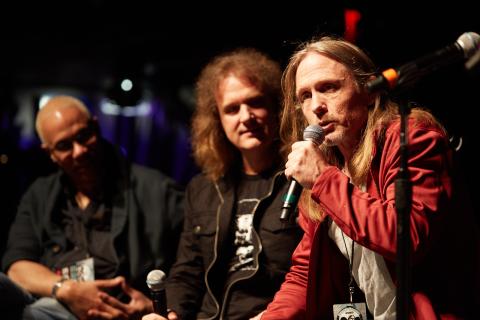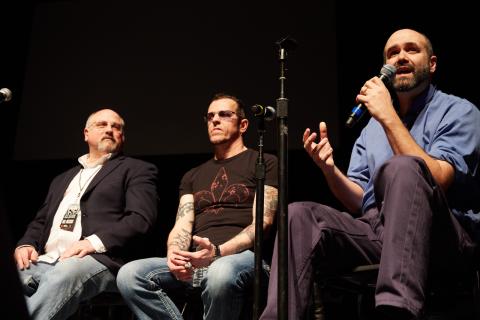27 Club Memorial Clinic: Berklee’s Right Turn Supergroup Shares Life Experiences, Lessons

Tony "Thunder" Smith, Dave Ellefson, and Steve Bailey
Photo by Kelly Davidson

Woody Giessmann, Gary Hoey, and Josh Kantor
Photo by Kelly Davidson
The 27-Club may sound like some elite, desirable group, but it’s actually quite the opposite. In fact, it’s not a club at all. Rather, it’s a term for popular musicians who’ve died at age 27, often from drug or alcohol abuse, or other violent means. Its roster is deep, and includes Jimi Hendrix, Janis Joplin, Jim Morrison, Amy Winehouse, and Kurt Cobain.
To pay tribute to these musicians, on April 4 members of the 2015 Right Turn Supergroup—representing bands such as Megadeth, Lou Reed, Bad Company, the Del Fuegos, and Jethro Tull—performed in a benefit concert at the Berklee Performance Center for Right Turn, a local, nonprofit innovative addiction treatment center that combines evidence-based treatment with creative expression. The day before, Supergroup members gave a clinic at the BPC to offer their perspectives from decades in the music industry.
Defining Success
Moderator Steve Bailey—chair of Berklee’s Bass Department who’s played with many musicians, including Jethro Tull—asked the panel to talk about success, questioning the notion that success means only commercial success or fame.
“I’ve been in a couple bands that had gold albums,” said Simon Kirke (Bad Company, Free), “but if you can’t lie your head down on the pillow at the end of the day with a clear conscience then you haven’t had a successful day. There was a gig that Free did where there were more people on the stage than in the audience, and it was one of the best gigs we ever had. But I’ve also played Madison Square Garden coked out and had an awful time. [Success] comes in many forms, but it has nothing to do with gold albums, I can assure you.”
“As an artist in recovery,” added Woody Giessman (Del Fuegos, CEO of Right Turn), “I feel successful when I am being true to my heart. For me, it’s trying to stay true to myself.”
Turning the Bad into Good
“I think it was Andre Agassi who said, ‘I learn more from my losses than my wins,’” said Bailey, quoting the legendary tennis pro to offer up the topic of overcoming disappointment in the music industry. “I think every one of us up here has at one point said, ‘This is just not worth it,’ no matter what level of success we have achieved. What can we learn from this experience?”
“I was in a band,” said Gary Hoey (Rock and Roll Fantasy Camp). “I was the guy showing up to rehearsal saying ‘you’re slowing down’ or ‘you’re dragging the beat.’ One rehearsal, I drew an imaginary line and said ‘It’s the [bass player] or me. Who’s with me?’ Nobody moved. I realized I was out of the band. From that day on, I looked deeper inside myself and said, ‘You have to learn to bring out the best in people without being a [jerk].’”
“For me,” said Giessman, “It was when my addiction had taken over to the point where the thing I cared most about, which was music, was taking a back seat to my addiction. I was taking gigs and playing music so I could support my drug habit. I remember looking at myself in the restroom mirror [at a video shoot] and not being able to make eye contact. The singer I was playing with was going on to play more gigs, and I wasn’t asked to come. It was an opportunity to get honest with myself. That was 1989, and I’m happy to say that next week I celebrate 25 years of recovery.”
Pivotal Moments
Bailey opened up the clinic to questions. An audience member asked what the pivotal moment of each musician’s career was.
“For me,” said Berklee percussion professor Tony "Thunder" Smith (Lou Reed), “[The pivotal moment] was when I was about 15. I thought I was the hottest drummer ever. I was invited to a jam session. There was this really great guitar player in the front. I thought we were killing, but he turned around and stopped the band. He said, ‘Son, let me see your drumsticks.’ He looks at my drum sticks. Finally, he gives me back my drum sticks and says, ‘Son, I think you need to go home and practice.’ I ran along the beach crying, swearing, saying, ‘I don’t care what it takes, I’m going to bury you. I am going to practice so hard.’ I think it might have been five months ago [that] it occurred to me: If it wasn’t for him, I wouldn’t be here.”
“Almost 18 years into my career, my band disbanded,” said Dave Ellefson (Megadeth), “My identity was at stake. What I did was I stayed true to myself. Pride can be a true enemy of so many things. We like being on stage, we like hearing applause. I found myself in a seven-year period where I was the man behind the scenes instead of the man in front of the scenes. It was a very humbling and ‘big boy grow up’ moment. But it made me appreciate the stage much more.”
